The History of Lewd: Nocturnal Illusion
The eroge sector is filled with fascinating games that, by their very nature as adults-only titles, do not feel constrained by the normal conventions of video gaming. And a great example of this is Nocturnal Illusion, first released in 1995, translated to English in 1997 and subsequently revamped for a Japanese rerelease in 1998.
In Nocturnal Illusion, you play the role of Shinichi, a young man who has been feeling rather put out with the way his life has been unfolding. In order to clear his head a bit, he decides to take a break in the wilderness, but disaster strikes when a storm hits and he suffers what appears to be a serious injury.
Shinichi, naturally, assumes that he has breathed his last, and thus is surprised to awaken in a comfortable, opulent mansion room being nursed back to health by a beautiful woman. He is even more surprised when said beautiful woman strips off and has sex with him before he’s quite finished regaining consciousness.
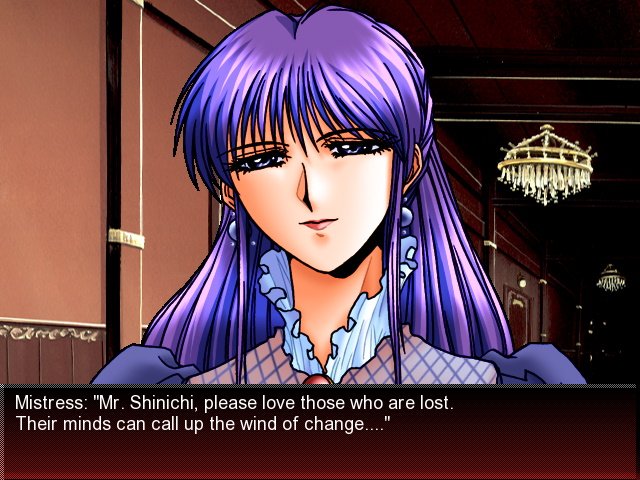
Don’t let the explicit opening fool you, however; Nocturnal Illusion, in stark contrast to something like Paradise Heights, is no simple nukige. Rather, it is an eroge where sex is used very deliberately at specific moments in the narrative in a symbolic manner. Specifically, it is always used as a symbol of healing and growth, and thus can often be found used as a way of punctuating the various crisscrossing narratives you’ll encounter as you explore the game as a whole.
One Shinichi is up and about, he discovers that the mansion he finds himself in is something of a haven of “lost souls”. These people aren’t necessarily dead — though the game does raise some interesting questions in this regard, particularly when you consider how Shinichi arrived, and how it is seemingly impossible for him to escape. Rather, they are “lost” in the sense that they have become disconnected from their “normal” lives or reality, either through their own deliberate actions, or their own subconscious desires.
Some of the lost souls became lost by attempting to take their own lives in order to escape from the situation they were in; others still sought “escape” in a more metaphorical sense through substance abuse or sexual deviance. And there’s one example of a character who claims to have stumbled across the mansion by accident rather than deliberately fleeing some aspect of her life — though naturally this raises all sorts of its own interesting questions.
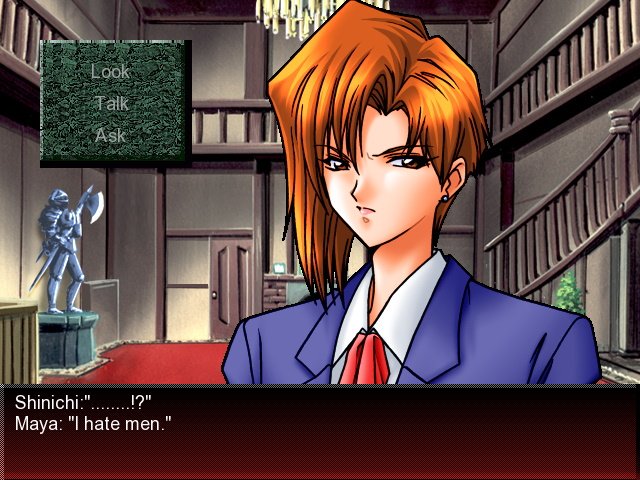
Much of Nocturnal Illusion’s narrative concerns the various inhabitants of the mansion learning to confront the things they were fleeing from, and determining some ways that they will be able to deal with them. Shinichi acts as a “wind of change”, in the words of the mistress of the mansion, in that he acts as a catalyst for the various characters’ growth, but is never the direct cause of their revelations. Instead, the things he says and the things he does sometimes provide the stimuli they need to find some answers — but he’s never the one to actually provide those answers himself.
The sexual content ties in with all this, too. As previously noted, sex in Nocturnal Illusion is typically used as a symbol of healing and growth, with the sexual act itself being representative of a character opening themselves up to intimacy and trust with another person. Perhaps more crucially, it also shows that they have come to accepting all of themselves — including aspects they might have once preferred remain hidden.
This is not an altogether unusual metaphorical and symbolic use of nudity and sex in Japanese popular media, but Nocturnal Illusion is a relatively early example of it being seen in video games — and it’s a very effective one.
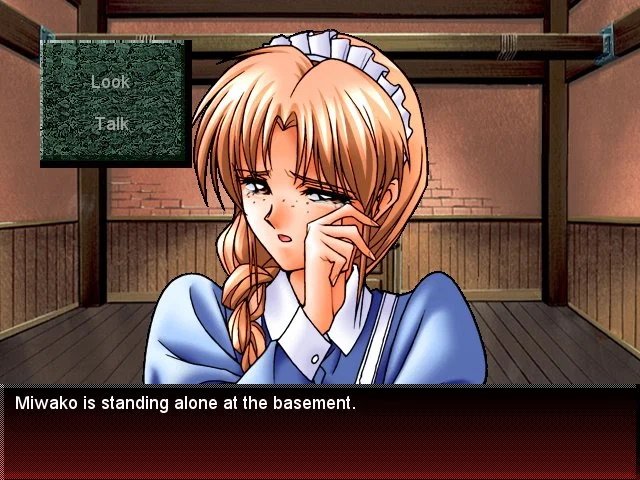
Nocturnal Illusion’s biggest strength is its surreal, dream-like quality that causes you to question how much of what you’re seeing is really going on — and whether any or all of it is simply the product of a fevered imagination as our protagonist dies alone in the wilderness. An important aspect of the experience as a whole is that it never really provides a definitive answer in this regard; instead, it incorporates a mysterious blend of the mundane and the fantastical, constantly keeping you guessing as to the real meaning of the situations you’re witnessing.
One moment you might be talking to news reporter Maya, who has developed an intense distrust of men due to her position as a woman in a field regarded as a “man’s world”. The next you might be chatting up a bloodsucking demon who lost her grip on reality when her lover never returned from war. Then you’ll be speaking with a character whose trust issues stem from being assaulted by an alcoholic father, then Little Red Riding Hood… and so it goes on. It’s like an interactive lucid dream.
And lucid it is; like many of the other games we’ve covered in The History of Lewd to date, Nocturnal Illusion is another example of a game that unfolds primarily as a linear visual novel, but which adopts some of the trappings of classic adventure games in order to appear more interactive.
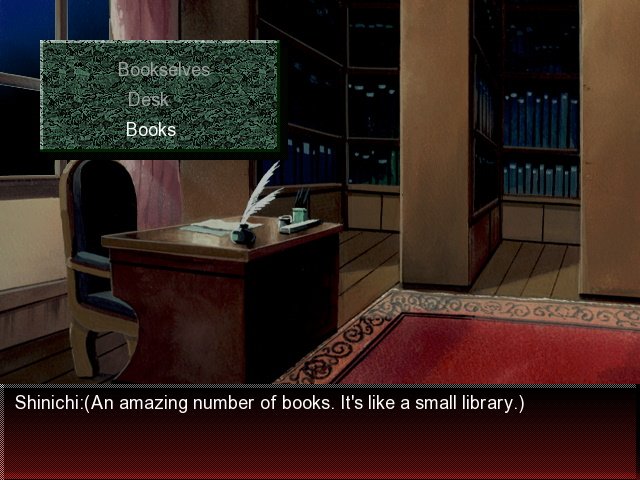
At most points in Nocturnal Illusion’s story, you have a choice of locations in the mansion that you can visit, and several actions you can take in each location; typically, there’s only one or two ways to advance the story at a time — or perhaps a hidden “checklist” of events you need to see in various locations before moving on — but the added interactivity makes you feel very involved in the unfolding action.
The game even plays with this side of things as a means of highlighting the dream-like nature of everything that is going on, too. Descriptions of static objects will change subtly over time; Shinichi’s attitude towards things will alter; you’ll become absolutely convinced that certain things are important, even if they’re completely irrelevant. The result is a feeling that while Shinichi feels like he is in control of his own destiny, he is, regardless, being swept along by events beyond his own control.
By the time the game reaches one of its several possible conclusions — with Shinichi finally escaping the mansion with one of the other cast members in tow — the game has raised almost as many questions as it has answered. Was their apparently shared experience in the mansion real? If so, why were neither of them able to escape for so long? How did they get there in the first place? And what of the other people they both met — were they real, or simply manifestations of their subconscious hopes, desires and fears?
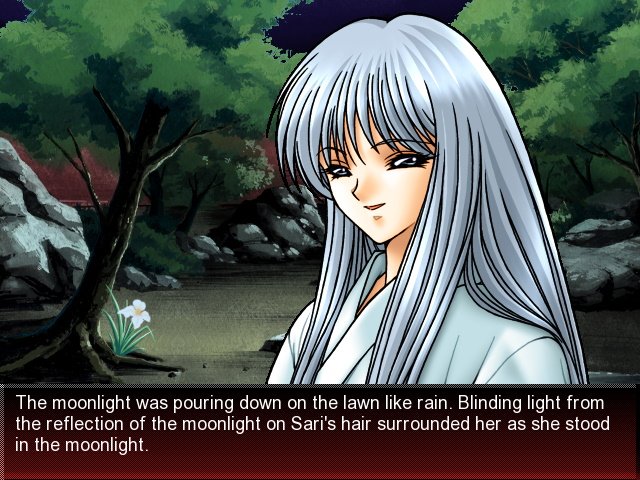
Nocturnal Illusion can and will leave you pondering things long after its end credits roll, and that makes it a strong, powerful work of fiction that is worth experiencing — even with its somewhat shaky English script!
Sadly, it’s been extremely difficult to get the original 1997 localisation by JAST up and running for several iterations of Windows at this point, though thankfully as with many of the other titles we’ve covered to date, the technical wizards at The Asenheim Project have got both the original and a localised version of the 1998 “Renewal” version up and running on the Web, so you can enjoy both this way. Note that the latter features some untranslated scenes, since the Renewal version was never fully localised.
Join The Discussion
Rice Digital Discord
Rice Digital Twitter
Rice Digital Facebook
Or write us a letter for the Rice Digital Friday Letters Page by clicking here!
Disclosure: Some links in this article may be affiliate links, which means we may earn a small commission if you make a purchase after clicking on them. This is at no additional cost to you and helps support Rice Digital!
- Letter from the Editor: passing the torch - June 30, 2023
- Super Woden GP 2 is looking promising - June 30, 2023
- Inti Creates is making a 32 bit-style Love Live action platformer - June 26, 2023







